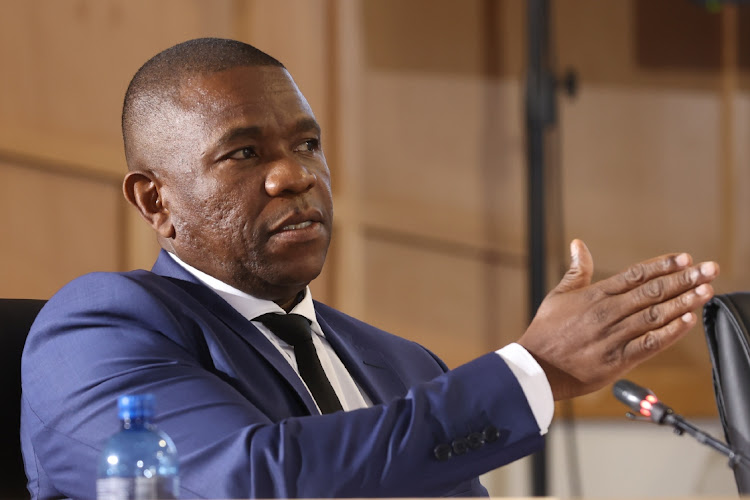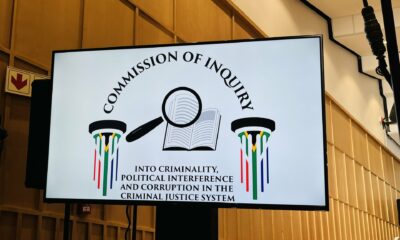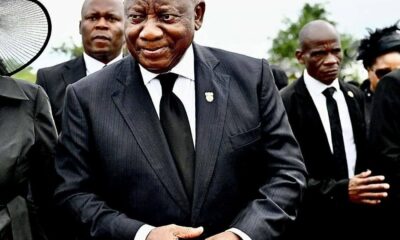News
Mkhwanazi Defends Disbanded Political Killings Task Team: “It Was Ramaphosa’s Directive, Not a Political Creation”

Mkhwanazi Pushes Back Against Claims of Political Interference
KwaZulu-Natal police commissioner Lt-General Nhlanhla Mkhwanazi has drawn a firm line between politics and policing, insisting that the now-disbanded Political Killings Task Team (PKTT) was not a political construct but a lawful executive response initiated under President Cyril Ramaphosa.
Mkhwanazi made the remarks under oath before Parliament’s Ad Hoc Committee, which is probing allegations of political interference and the controversial decision to shut down the PKTT. Calm but assertive, he told MPs that the task team “was created by the executive authority of the state, not by politicians.”
Born Out of Crisis: How the PKTT Began
The PKTT’s origins stretch back to May 2018, when the assassination of ANC member Musawenkosi Mchunu in Pietermaritzburg shocked the nation. Ramaphosa, who was visiting KwaZulu-Natal at the time, called for an urgent intervention to stem the rising tide of political murders.
Within a week, a group of ministers convened in Durban and drafted a plan that led to the establishment of an Inter-Ministerial Committee (IMC) formally announced by Ramaphosa in Parliament on 24 May 2018.
Mkhwanazi, then acting provincial commissioner, was instrumental in rolling out the operational side of the plan. He requested the deployment of senior officers, including Brigadier (now Lt-General) Dumisani Khumalo, to assemble a multidisciplinary team that became the PKTT.
According to Mkhwanazi, the team’s mandate was straightforward but daunting: investigate and stop the wave of political assassinations that had plagued KwaZulu-Natal for over a decade.
“Not a Political Tool, But a State Response”
Testifying before Chief Evidence Leader Norman Arendse SC, Mkhwanazi rejected the suggestion that the PKTT was politically motivated or controlled by any party agenda.
“The Minister of Police acts under executive authority, not as a political actor,” he explained. “If you say the task team was political, what happens when the minister belongs to a different party? The argument simply doesn’t hold.”
He clarified that the PKTT operated provincially but was financed through a dedicated SAPS national budget. Specialists from across the country were seconded to the unit, and the National Prosecuting Authority, Correctional Services, and State Security Agency also provided support.
“The team was multidisciplinary, not partisan,” Mkhwanazi added. “Its purpose was justice, not politics.”
Behind the Scenes: Friction, Oversight and Closure
Initially, the IMC had been critical of SAPS’ performance, demanding stronger results in arrests and prosecutions. Mkhwanazi said this pressure led to a refined policing plan one that was eventually approved by national leadership and backed by the ministers.
For several years, the IMC met regularly, monitoring progress and updating the public through briefings. But after the 2024 national elections, those meetings stopped, and the committee’s continuity appeared uncertain.
The situation escalated when then-Police Minister Bheki Cele issued a directive on 31 December 2023 dissolving the PKTT. The move sparked widespread speculation that the decision was politically motivated a claim Mkhwanazi strongly refuted.
“The minister’s instruction was lawful,” he said. “It wasn’t political; it was an administrative decision. The PKTT was never meant to be a permanent unit. It was created with a specific purpose, a defined budget, and a clear chain of command.”
A Broader Debate: Politics vs. Policing in KZN
The controversy around the PKTT’s shutdown comes at a time when political assassinations in KwaZulu-Natal remain a national concern. From councillors to party officials, killings linked to local power struggles have long haunted the province.
Critics argue that disbanding the task team sends the wrong signal in a region where political violence often thrives in the shadows. On social media, users have voiced frustration, with some calling the decision “tone-deaf” and others demanding the team’s reinstatement.
However, Mkhwanazi’s testimony reframes the narrative, positioning the PKTT not as a political pawn, but as a state-led intervention that fulfilled its mandate within the structures of government authority.
As Parliament weighs his statements, one question lingers: if the PKTT wasn’t political, why did it become so politically controversial?
For now, Mkhwanazi stands by his story that the task team was born out of presidential urgency, not party influence, and that its disbandment, while contentious, was lawful and procedural.
{Source: IOL}
Follow Joburg ETC on Facebook, Twitter , TikTok and Instagram
For more News in Johannesburg, visit joburgetc.com



























